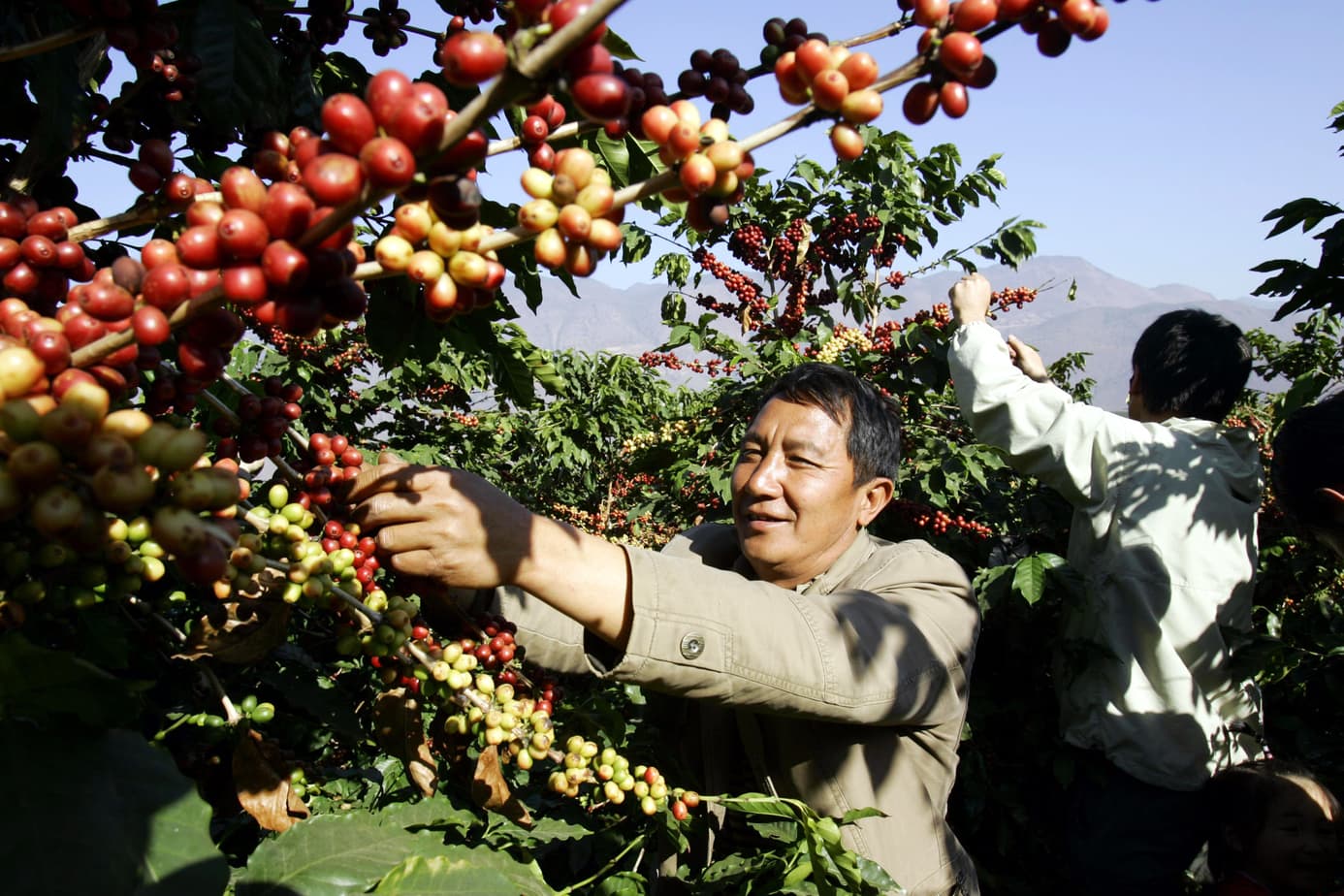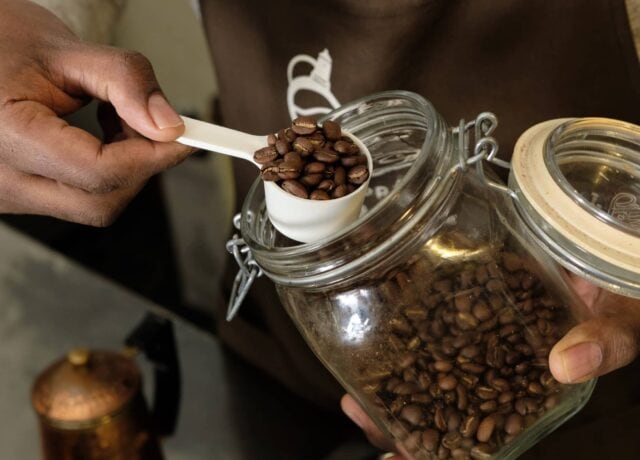Yunnan is a province located in the southwest of China with a population of approximately 48,000 people. It borders on other Chinese provinces, as well as Myanmar, Laos, and Vietnam. In 2014, Yunnan was China’s fourth-least developed country based on the country’s disposable income.
Since it is a particularly mountainous country with an abundance of plant life and natural resources, Yunnan is a great place to farm coffee. So much so that in 2016/17 when China was in the worldwide top 20 coffee producers, the coffee of Yunnan alone accounted for a frankly ridiculous amount of it: 95 percent.
How did the Chinese coffee industry develop over the years? How is Yunnan coffee produced? And what does it taste like?
Let’s dive into the world of Yunnan coffee.
The History of Chinese Coffee Beans
In the late 19th century, a French missionary named Tian De Neng introduced a few coffee plants to Yunnan in the hopes that he might be eventually able to serve himself his own coffee each morning. After this, coffee was introduced at a small scale again, with coffee plants from Myanmar.
Coffee growing in Yunnan developed slowly and steadily until 1988 when the modern coffee industry in China as it is known as today began. With the likes of the Chinese government, World Bank, and the United Nations Development Programme working together coffee cultivation on a much larger scale was introduced to the region.
Only a year later, Nestlé planted many of the rust-resistant Catimor varieties in Yunnan. This turned coffee into a major cash crop for the province. Catimor was developed in 1959 as a crop with potentially high yields, disease resistance, and small size which made it possible for many to be planted within a small area.
What Coffee Is In Production In Yunnan?
Just like we mentioned earlier, almost all of the coffee from China comes from the Yunnan Province and accounts for all but 5 percent of China’s total output. This tiny remaining percentage comes from minor arabica harvests in various other areas of China, as well as the robusta from the Fujian and Hainan provinces.
In Yunnan, it’s exclusively arabica varietals that are grown. These coffees are primarily fully washed and have good screens. Screening is the method – by using many metal sheets with holes in – which help determine the size and shape of a bean. Traditionally, even-numbered screened beans are used for arabica and odd screens for robusta.
But Yunnan’s arabica is not always as good as it could be. Compared to other coffees, Yunnan coffee can sometimes provide an inconsistent cupping experience, which is thought to be due to the lack of standardized washing processes involved in coffee production.
From farm to farm in China there is, unfortunately, still very little in the way of consistent quality control. Experienced professionals are providing increasing amounts of practical guidance to coffee farmers, educating them on the ideal methods of coffee production.

Expanding Volume
Over the last two decades, the production of coffee in Yunnan has increased substantially. In 2009, 26,667 hectares of arabica were planted in Yunnan province – in only 6 years, this number rose 124,650 hectares.
As more coffee has been planted in Yunnan, the amount of coffee China exports annually has risen too: it exported 33,780 tons in 2009 and in 2015 the number jumped to 83,538.
Production of coffee has expanded drastically over the last 20 years. Figures provided by the United Nation’s Food and Agricultural Organization (FAO) for 2013/14 suggest that what China harvested resulted in just over 1.9 million bags of coffee.
In 2006, China occupied the 30th position for the world’s largest coffee traders, but this success a decade later placed them in the 14th position.
The Coffee Traders Are Keeping Busy
Starbucks China works intimately with Yunnan coffee traders – as well as purchasing Yunnan coffee for domestic consumption, they also export it around the world.
A key element of this relationship is that Starbucks China aims to support not only Yunnan coffee traders and its coffee industry but also the farmers. By paying premium prices for the product, they are directly benefiting those who are working the hardest for the crop.
The Starbucks Farmer Support Centre
In 2012, Starbucks China opened the Farmer Support Centre in Pu er – a city in southern Yunnan province – intending to support the farmers of Yunnan coffee.
Agronomists – experts developing methods to best increase the quality and production of crops – are with the farmers every day, collaborating with them, sharing their knowledge and exchanging ideas that can further benefit the specialty coffee industry in China.
Nescafé Coffee Center
In 2015, Nescafé opened its Coffee Center intending to strengthen the company’s exporting and purchasing capacity.
It currently functions as Nestlé’s green coffee buying station, from which the company can supply eight Nescafé factories in Oceania and Europe as well as factories in China. So it’s not just instant coffee that they’re interested in…
The center also includes facilities that educate farmers on various agricultural methods, as well as post-harvest management. This is having a big impact on crop quality in China and the effectiveness of methods to farm the crop.
Chongqing
Chongqing is a megacity in Southwest China. Due to a classification technicality, it is the largest city proper in the world. It also doubles as China’s largest domestic hub for trading quality coffee.
The Chongqing Coffee Exchange was introduced as a platform for trading coffee by the Chongqing Energy Group. Here, both home-grown coffees as well as coffee sourced from Southeast Asia are given a platform for trading.
Most Importantly: How Does Yunnan Coffee Taste?
Similarities have been drawn between the taste of coffees from the Yunnan province and Colombian washed coffees.
Yunnan coffee will often be sweet, accompanied by a complex acidity (both malic and phosphoric). Phosphoric acid provides coffee’s unique bright acidic taste. Coffee with higher levels of Malic acid instead commonly taste of apple or even pear.
Yunnan’s specialty coffees have many unique qualities, including:
- Nuttiness
- A mixture of fragrant spices
- Dark chocolate
- Black tea
- Dried cherries
Interestingly, the latitudinal position of Yunnan means there are much cooler temperatures at night at higher altitudes which provides a much sweeter quality to the bean.
This is because cooler temperatures provide slower growth cycles which prolong bean development. Longer periods of maturation lead to extra sweetness. This high elevation also means that the soil is drained more effectively – less water remains in the fruit and so the quality and flavors are even more concentrated.

Yunnan Coffee Traders
Yunnan Coffee Traders is an enterprise operating out of Yunnan province, prioritizing in China’s specialty coffee. The company was formed in an attempt to focus on great, local Yunnan specialty coffee and expand global interest in it.
To stay accountable, remain focussed, and not lose track of what kind of company they want to be, Yunnan Coffee Traders have outlined online what keeps them motivated: their Values, Vision, and Mission.
Mission
- To create jobs for the farmers of China, employing sustainable agricultural practices.
- Employ the best practices for sourcing, processing wholesaling, and exporting specialty coffee.
- Supply coffee to roasters and importers who care about sustainable practices.
Vision
- To eventually be the largest supplier of Yunnan’s specialty coffee to the global community.
Values
- Achieve zero waste in the production of their coffee.
- Mutual inspiration in their partnerships.
- Uncompromising in the quality of their coffee.
Sharing Essential Information
Yunnan Coffee Traders are not only committed to producing great coffee sustainably, and they also know the importance of being transparent with their customers.
On their website, they have defined what washed, natural, micro-lot, and pulp natural coffee is, and made extensive lists of each specialty coffee of theirs which fits into each category. Where possible they include the name, farm, region, cultivar, sizing, cupping score, elevation, annual yield, and tasting notes.
Not stopping there, they have also outlined each way a bean can be processed, be it washed, natural or pulp-natural. Currently, there are also seven individual short but detailed sections discussing each of their washing stations that are located in China.
They don’t just focus on the farming of specialty coffee. They also make note of who manages each farm be they a father and son team or a married couple passionate about coffee. How each different farm processes their beans is also included, as well as if any of the farms have had success with their crop. (Spoiler alert: most of them have!)
A True Specialty Coffee Marvel
Yunnan – and so China as a whole – have made a serious impact on the coffee world in not many years at all. There is a huge interest in Yunnan coffee that spells sure continued success for everyone involved in the industry.
With beans of such excellent quality, we can’t see Yunnan disappearing from the coffee radar any time soon, or even at all.
As always, happy caffeinating – until next time!







